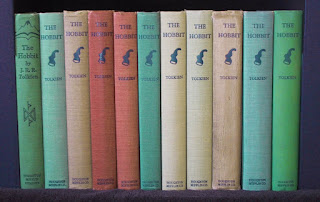The good characters are those who use their power and skill to help their friends. Bilbo Baggins the hobbit is the foremost of these, working diligently to save the dwarves from the many perils that beset them. Despite their ingratitude, Bilbo keeps working with them. His heart is for peace, and he gives Bard and the Elvenking the magnificent jewel known as the Arkenstone in an attempt to resolve disputes about the treasure of Smaug.
Perhaps the most well-known hero of Middle-Earth is Gandalf. He uses his wisdom and skills to help others. In this story, the others are the company of dwarves with the hobbit. His knowledge of woodland creatures comes to their aid, as does his valor in battle.
Elrond of the Elves is another hero, but in a different way than Gandalf or Bilbo. Elrond is a hospitable, generous, merry and wise elf whose house is open to travellers. Whether you liked “food, or sleep, or work, or story-telling, or singing, or just sitting and thinking best, or a pleasant mixture of them all,” Elrond’s house possessed it (Tolkein 61). Lavishly he bestows gifts on the travellers: food, advice, and decryption of the moon-runes on Thorin’s map, without ever a thought of reward.
Ambiguous characters use their powers for both good and evil ends. Thorin Oakenshield is an excellent example of an ambiguous character. We see him fight valiantly against the trolls in defense of his companions. However, Thorin is also consumed by greed when the treasure stolen by Smaug the dragon is recovered. He refuses to give any of it to the Men of Lake-Town, even though their town was destroyed by the dragon. So greedy is he that he determines to fight to keep all the gold to himself, away from Men and their allies the Elves. But Thorin turns from a villain to a hero when he forgets his greed, allying with the Men and Elves to defeat the mighty goblin army. Mortally wounded in the battle, Thorin begs Bilbo for forgiveness before he dies, which Bilbo readily grants.

Another example of an ambiguous character is the Elvenking. When we first meet him, he seems more like an evil character, capturing the Dwarves and locking them in dark dungeons. As the story progresses, we see another side to the Elvenking: he is a just and kindly ruler who does not want to fight the dwarves coming to reinforce Thorin in the Lonely Mountain.
In contrast to the good or even ambiguous characters, evil characters only use their power to enrich themselves without caring whom they hurt. The dragon Smaug the Terrible is the perfect example of this kind of character. After destroying the dwarves’ halls in the Lonely Mountain and the men in the kingdom of Dale, he settles inside the mountain, counting the horde of gold that he has amassed. Not content to ravage the countryside, he tempts Bilbo to turn against his companions the dwarves, cynically observing that “I suppose they are skulking outside and your job is to do all the dangerous work.” (Tolkein 214)
But Smaug is not the only evil character in The Hobbit. The Master of Lake-Town is almost the complete opposite from Smaug, but he is still an evil character. While Smaug is full of rage and powerful destruction, the Master of Lake-Town is cunning and double-dealing. He seeks to escape from Lake-Town as Smaug attacks it, but then proceeds to take a shelter and much of the food left in the wrecked town when the dragon is dead. Despite receiving a large share of unearned gold from Bard the Bowman, the Master refuses to use it to help rebuild the town. Instead, he embezzles it and makes for the wilderness, only to die, deserted by his companions.
Conclusion
The characters in Tolkein’s book The Hobbit come in three easily recognizable types: good, evil, and ambiguous. But these three are not found in Middle-Earth only. It is easy to see people we know who are self-focused like the Master of Lake-Town, or generous like Elrond. Perhaps this explains the reason that The Hobbit has endured as a classic for 80 years: though it is set in a fantasy world with dragons and dwarves, the characters are easily identifiable because we encounter people like them in our everyday lives.
References
Tolkein, J. R. R. The Hobbit. New York: Ballantine Books-Houghton Mifflin, 1966.
